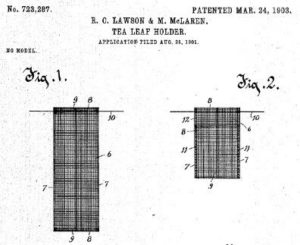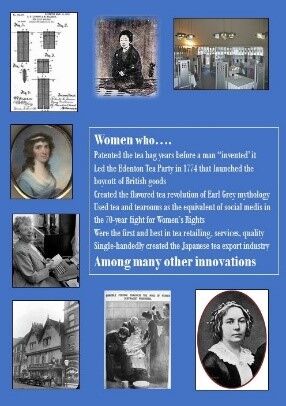
 Well how about the tea bag? Invented in 1908 by a New York man. Um …. Patented 1901-03 by two women.
Iced tea? A British male trader introduced it 1904. Come on … The standard recipe is Mabel Cabell Tyree, in 1879.
The narrative is that men go out exploring. They invent machines. Men go to war over tea: the American Revolution, Britain’s two Opium Wars. They found businesses: Thomas Twining, Thomas Lipton.
The women sit and sip. Just about every history of tea picks out as the three female “innovators” of tea: Catherine of Braganza, Queen Anne and Anna, Duchess of Bedford.
Catherine introduced tea to England. No.
Anne moved tea to the center of English culture. No.
The Duchess invented afternoon high tea. Oh dear. It was 150 years old.
Here are a few instances of the real innovators: Heroines of Tea. Heroism is dictionary-defined as embodying courage, achievement and noble characteristics.
Penelope Barker: led the 1774 Edenton Tea Party, North Carolina, the first women organized public political protest.
Well how about the tea bag? Invented in 1908 by a New York man. Um …. Patented 1901-03 by two women.
Iced tea? A British male trader introduced it 1904. Come on … The standard recipe is Mabel Cabell Tyree, in 1879.
The narrative is that men go out exploring. They invent machines. Men go to war over tea: the American Revolution, Britain’s two Opium Wars. They found businesses: Thomas Twining, Thomas Lipton.
The women sit and sip. Just about every history of tea picks out as the three female “innovators” of tea: Catherine of Braganza, Queen Anne and Anna, Duchess of Bedford.
Catherine introduced tea to England. No.
Anne moved tea to the center of English culture. No.
The Duchess invented afternoon high tea. Oh dear. It was 150 years old.
Here are a few instances of the real innovators: Heroines of Tea. Heroism is dictionary-defined as embodying courage, achievement and noble characteristics.
Penelope Barker: led the 1774 Edenton Tea Party, North Carolina, the first women organized public political protest.
 Mary Tuke: first great tea retailer. Helped make York the Chocolate City center of global trade.
Oura Kei: single-handed creator of the Japanese tea export trade.
Catherine Cranston: pace-setter for tea room service and design, reshaping the identity of a city.
Ruth Bigelow: first major U.S. tea brand, that changed American taste.
Elizabeth Cady Stanton: heart, mind, pen and voice in launching the Women’s Rights revolution – from a small tea gathering.
Alva Belmont: funded, organized and led Rights activism. She used tea as mobilizing force equivalent to today’s social media.
Mary Shaw: the star actress of New York; made tea and theater a force of education, persuasion and sisterhood.
Elizabeth Petrovna: the Iron-fisted Fashionista Empress of Russia, created the tea trade with China.
Anna Akhmatova: Anna of all the Russias, Stalin’s victim and the poet who recorded the times of terror, tea – and poverty.
The lists go on. Individually, these are interesting people and stories. Together, they add an extra dimension to the history of tea, of their times and of womens’ roles and impacts.
Mary Tuke: first great tea retailer. Helped make York the Chocolate City center of global trade.
Oura Kei: single-handed creator of the Japanese tea export trade.
Catherine Cranston: pace-setter for tea room service and design, reshaping the identity of a city.
Ruth Bigelow: first major U.S. tea brand, that changed American taste.
Elizabeth Cady Stanton: heart, mind, pen and voice in launching the Women’s Rights revolution – from a small tea gathering.
Alva Belmont: funded, organized and led Rights activism. She used tea as mobilizing force equivalent to today’s social media.
Mary Shaw: the star actress of New York; made tea and theater a force of education, persuasion and sisterhood.
Elizabeth Petrovna: the Iron-fisted Fashionista Empress of Russia, created the tea trade with China.
Anna Akhmatova: Anna of all the Russias, Stalin’s victim and the poet who recorded the times of terror, tea – and poverty.
The lists go on. Individually, these are interesting people and stories. Together, they add an extra dimension to the history of tea, of their times and of womens’ roles and impacts.
 Hear more about them and many others at the World Tea Expo.
Tea Heroines: Women Who Left a Thumbprint on History Through Tea This session reviews the innovations of tea Heroines. 1:30-2:30 p.m. Wednesday, June 13, Main Stage Expo Floor
Hear more about them and many others at the World Tea Expo.
Tea Heroines: Women Who Left a Thumbprint on History Through Tea This session reviews the innovations of tea Heroines. 1:30-2:30 p.m. Wednesday, June 13, Main Stage Expo Floor
